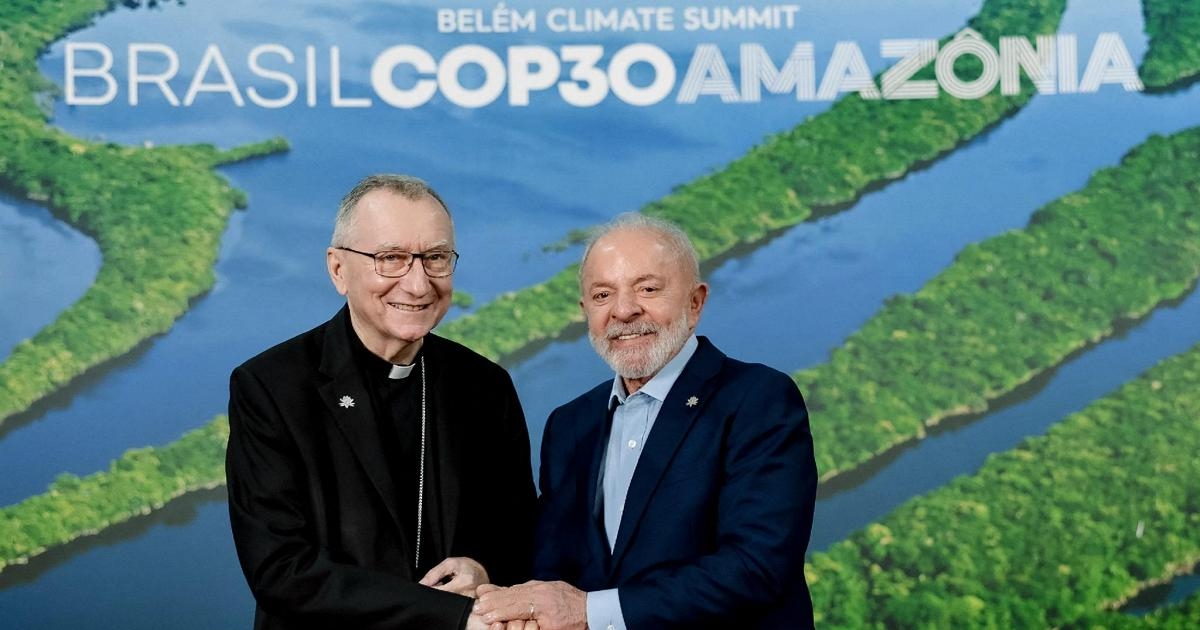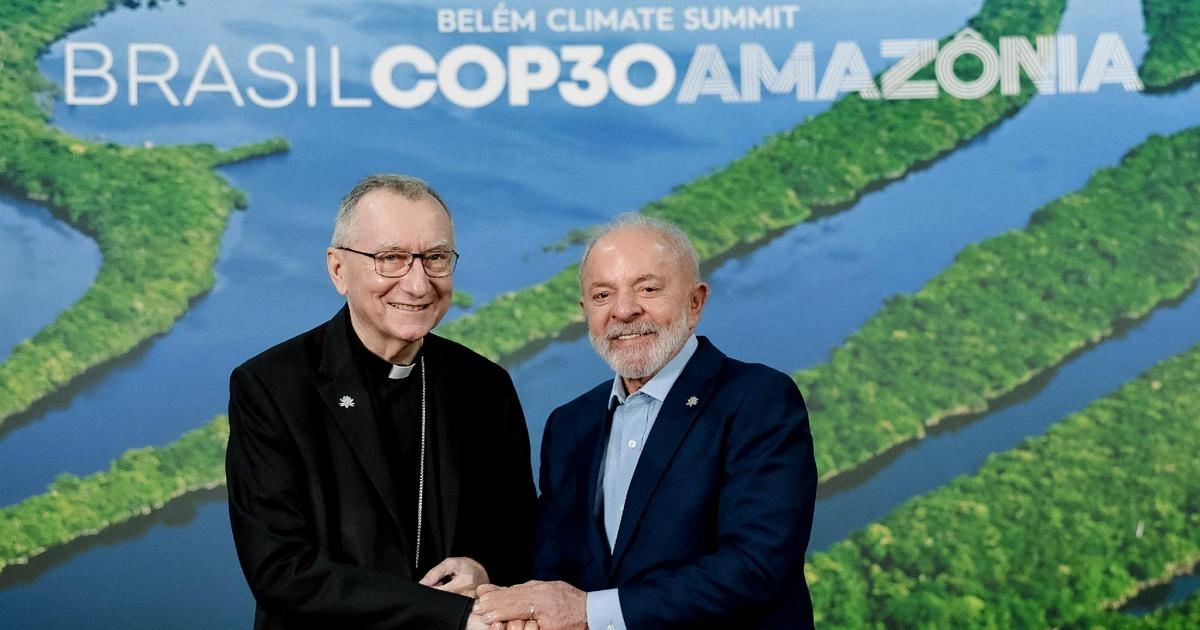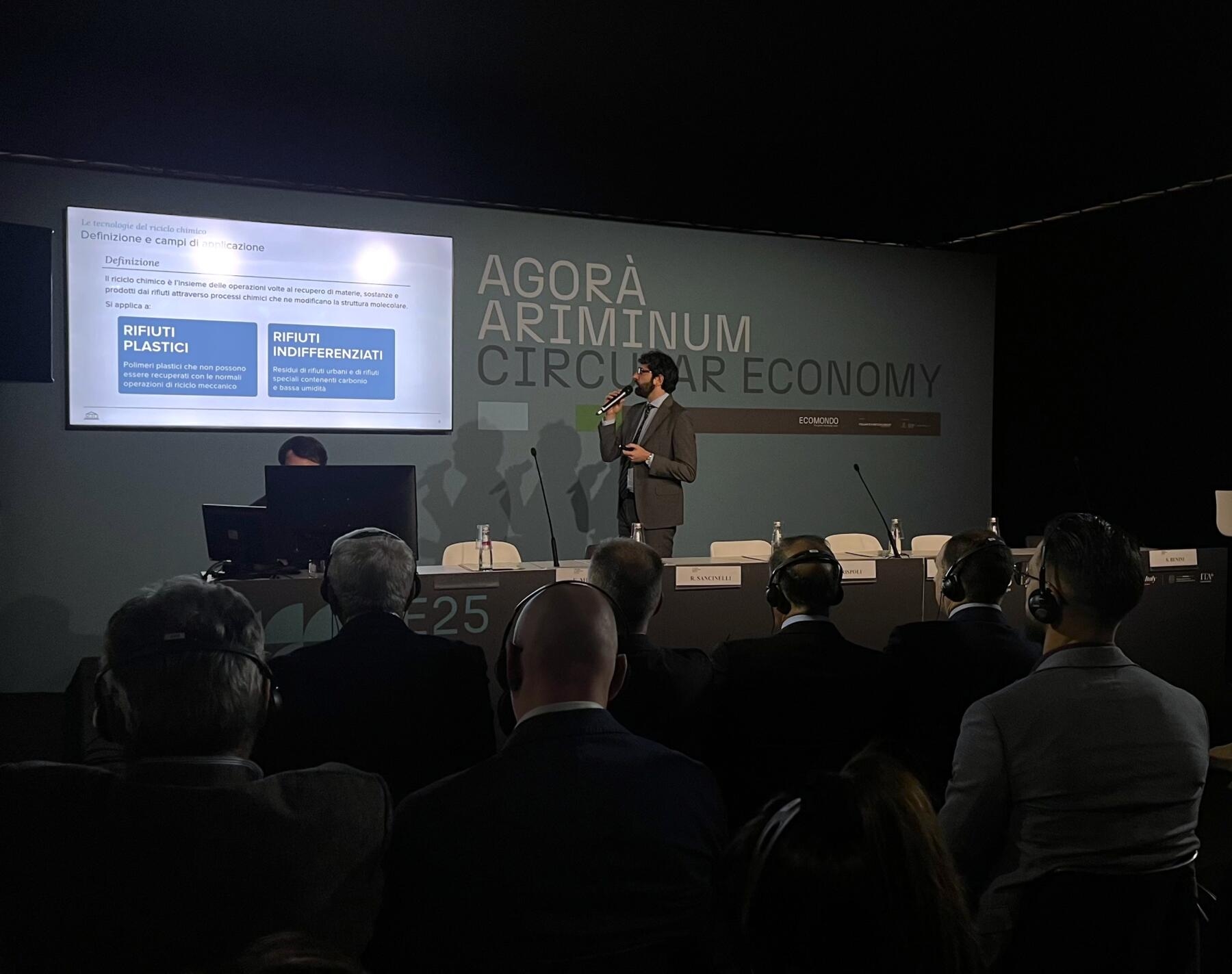COP30, Leo XIV: "Let it be a sign of hope in a burning world."

“ In a world burning, both due to global warming and armed conflicts”, COP30 should become “a sign of hope , through the respect shown for the opinions of others in the common effort to seek a common language and consensus, putting aside selfish interests, keeping in mind mutual responsibility and that of future generations”.
Pope Leo XIV expressed his hope for this in his letter, read by the Secretary of State, Cardinal Pietro Parolin, at the 30th session of the Conference of the States Parties to the United Nations Framework Convention on Climate Change (COP30), which begins on Monday in Belem, Brazil.
The pre-summit with the heads of stateAlready on Thursday, around fifty heads of state and government gathered at the invitation of President Luiz Inacio Lula da Silva for the Belém Climate Summit , a pre-summit to try to make some progress in discussions before the actual conference begins. Four of the world's five most polluting economies are missing : China, the United States, Russia, and India. The United States, led by Donald Trump, will not send high-level representatives to the main meetings of COP30 this year either.
Lula: "Lies from extremist forces about climate change"In his opening remarks at the summit of heads of state and government preceding COP30 in Belém, Lula warned that "the window of opportunity" to act against global warming "is rapidly closing." " Extremist forces fabricate lies to gain electoral advantage and imprison future generations in an outdated model that perpetuates social and economic inequality and environmental degradation," he denounced. For the Brazilian president, "accelerating the energy transition and protecting nature are the two most effective ways to combat global warming. Despite our difficulties and contradictions, we need a roadmap to thoughtfully and equitably plan the effort required to reverse deforestation, overcome dependence on fossil fuels, and mobilize the resources needed to achieve these goals." However, "in a context of insecurity and mutual distrust, immediate selfish interests prevail over the long-term common good."
Lula also mentioned the "hundreds of indigenous peoples in the Amazon," who, he said, suffer from a "false dilemma between prosperity and environmental conservation." "That's why it's right for the Amazonians to ask what the rest of the world is doing to prevent the collapse of their home," he added.
Environmental protests have already begun to make themselves heard in recent days: in the one shown in the following video, organized by Oxfam , one of the most important global NGOs, global leaders are depicted relaxing and sleeping “while the world burns”, explains executive director Viviana Santiago.
COP30 Leaders' Summit in Brazil, November 7, 2025 (ANSA)
Lula is facing considerable criticism for greenlighting oil exploration off the coast of the Amazon . "It's very contradictory," says Angela Kaxuyana of the Coordination of Indigenous Organizations of the Brazilian Amazon. "The same governments" committed to climate action are "negotiating oil exploration" in the largest rainforest on the planet.
However, among the Brazilian president's goals is to promote his proposal, the Tropical Forest Forever Facility (TFFF), a multilateral financing mechanism to support the conservation of endangered forests and the people who live there. Brazil has asked countries to invest in the fund. But the United Kingdom, which helped define the fund's operating modalities, disappointed expectations on Wednesday by revealing it would not offer any financial contribution. Brazil has offered the first investment, opening a new $1 billion fund in September, and last week Indonesia pledged to do the same, Lula said. China has also said it will contribute, but has not yet specified the amount. No rich, industrialized country has yet announced contributions.
"Enough talk, now is the time to implement what we agreed upon," Lula told reporters, explaining that given the failure of the Paris goal of limiting global warming to 1.5°C above pre-industrial levels, set ten years ago, it's not time for new grand symbolic decisions, but for concrete commitments to keep past promises, such as on the development of renewable energy. "Many of our countries will not be able to adapt to warming exceeding 2°C ," explained Ilana Seid, a diplomat from the Pacific archipelago of Palau and president of Aosis. "Some of our atoll countries would no longer exist."
Greenpeace put a graphic synthesis of the situation on display in Berlin, projecting a planet on fire on the famous television tower.
"We have failed" to achieve the goal of keeping global warming to 1.5°C above pre-industrial levels, UN Secretary-General António Guterres denounced in Belém. "A temporary overshoot of the 1.5°C limit, starting no later than the early 2030s, is inevitable," he continued. "We need a paradigm shift to limit the magnitude and duration of this overshoot and reduce it rapidly. Even a temporary medium overshoot will have dramatic consequences. It could push ecosystems beyond irreversible tipping points, expose billions of people to unlivable conditions, and amplify threats to peace and security. Every fraction of a degree means more hunger, displacement, and loss, especially for those least responsible. This is a moral failure and deadly negligence. What is still lacking is political courage. Fossil fuels continue to receive massive subsidies—taxpayers' money. Too many companies are making record profits off climate disruption, spending billions on lobbying, deceiving the public, and hindering progress. And too many leaders remain captive to these entrenched interests. Too many countries lack the resources to adapt and are excluded from the energy transition." clean. And too many people are losing hope that their leaders will act."
A report by the United Nations Environment Programme ( UNEP ) detailed in recent days that "the scale of the cuts needed and the short time available to implement them mean that the multi-decadal average global temperature will now exceed 1.5°C, most likely within the next decade", although "rigorous emissions reductions in the short term could delay the overshoot, but not avoid it entirely. The great task ahead is to try to make this overshoot temporary and minimal, through rapid emissions cuts that keep a return to 1.5°C by 2100 within the realm of possibility. Every fraction of a degree avoided reduces the escalation of damage, loss and health impacts that are harming all nations, hitting the poorest and most vulnerable hardest, and reduces the risks of climate tipping points and other irreversible impacts".
Currently, if each country keeps its commitments, projections range between 2.3 and 2.5°C by the end of the century (they were between 2.6 and 2.8°C a year ago); if these commitments are not met and current policies remain unchanged, the projection would be 2.8°C (a year ago, 3.1°C more was projected).
And it is little consolation to note that, among the world's major economies, the only one to have done its homework – that is, to have reduced emissions from industry and transport – has been the European Union.
The contribution of major economies to greenhouse gas emissions between 2023 and 2024. The LULUCF column refers to emissions from deforestation and land use, calculated separately at the global level (UNEP)
06/11/2025
Rai News 24




